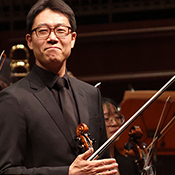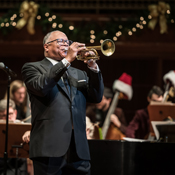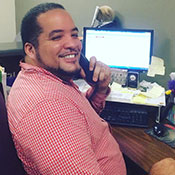
Simon Trpčeski Performs Rachmaninoff’s Piano Concerto No. 1
David Lewellen
PUBLISHED
Tagged Under: 2024.25 Season, Classics, Guest Artist
The Milwaukee Symphony will open its Classics season Sept. 27-29, with a program that includes Rachmaninoff’s Piano Concerto No. 1, featuring Macedonian pianist Simon Trpčeski. MSO Backstage writer David Lewellen spoke to Trpčeski by phone recently; here is an edited version of their conversation.
Q. You haven’t played with the MSO since the 2018.19 season, and then we had a pandemic. What went into making this concert happen?
A. There were several discussions about a comeback, and it changed twice before we got this finalized. I’m very happy that the Milwaukee Symphony chose Rachmaninoff’s first concerto, because it’s not often played and it’s my very favorite of the Rachmaninoff concertos. It will be my first time in the new hall, and I’m happy to open the season.
Q. Is there any additional pressure to being featured on the opening concert?
A. To be honest, I don’t occupy myself with that very much. I think about the Rachmaninoff, which is sharing joy, which we so much need. I’m happy to be sharing the emotions of the people involved in the musical life of Milwaukee.
Q. Tell me more about the concerto and why it’s your favorite work by Rachmaninoff.
A. It’s fresh and full of energy. It’s a showcase for Rachmaninoff as he was developing as a musician. Despite his youth, there’s lots of unexpected maturity in the choice of musical material and the orchestration, the instrumental colors and combinations. It’s full of lots of bombastic emotions, and I’ll give it my best.
Q. Why do you think it’s less popular than the second or third concertos or the Rhapsody on a Theme of Paganini?
A. I think Rachmaninoff was too busy promoting the later works. It’s a challenge for both pianist and conductor because it’s sadly neglected. But I played it last year in Detroit, and this year I’m also playing it in Baltimore and Chicago. I’m very happy to get more opportunities to share it.
Q. Is there anything different about preparing or performing a composer like Rachmaninoff, who was first famous as a virtuoso pianist?
A. I’m playing Brahms this week, and the technical challenges each have their own approach. They’re simply different. I don’t make too big a thing of it. I just sit and practice. The more important thing is interpretation. Nothing is done for the sake of bravura pianism.
Q. Really? All those big fast clouds of notes and there’s no showing off at all?
A. Maybe a little. You can make a joke of your own ability, being a genius. But 99.9 percent of it is trying to be serious, putting all those things in the service of the music.
Q. I saw on your website that you’ve produced a CD of Macedonian folk music. Tell me more about that.
A. Macedonia is a small country, but it has a deep history of folk music. My first love was accordion. But as I studied classical piano, I realized that our folk music has deep meaning and a lot of potential. All classical composers know the folk music of their own country, and my idea was to have a sophisticated approach to our own folk music. I’m grateful to our arranger, Pande Shahov, and the other musicians. We’ve performed in 18 or 19 countries, and we’d like to bring it to the United States.
Q. Do you still play accordion?
A. Not much lately. It’s a different technique from piano. Your wrists get tired. But I do play it a little on the album, and I sing, too.
Q. Did you ever have any vocal training?
A. No, but I grew up in a culture where singing and dancing and making music with friends and family was part of my upbringing. When you grow up in that kind of setting, with music as a part of your life, it comes very natural.



